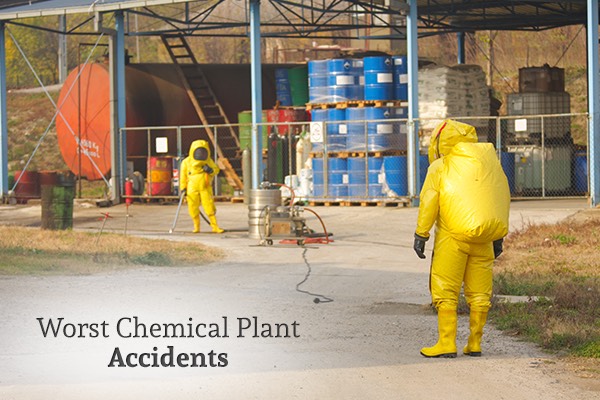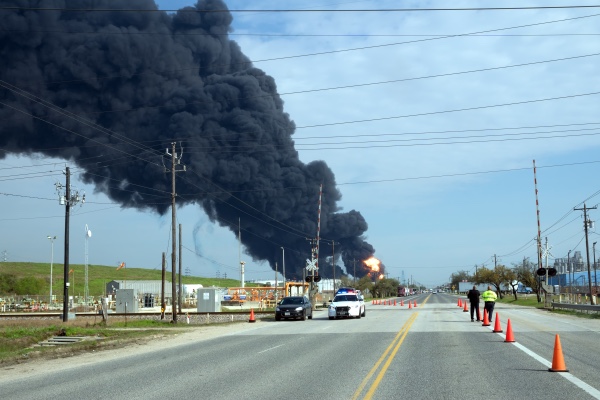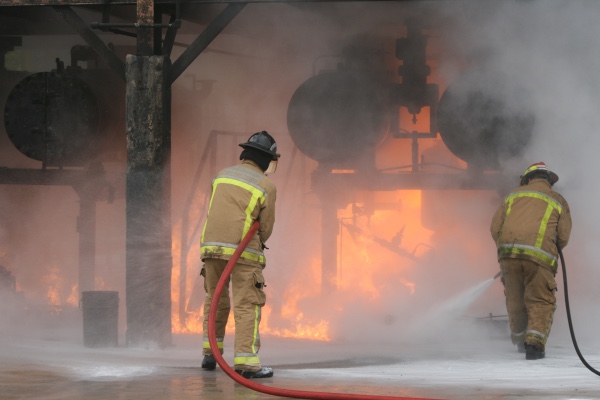
When the United States went through the Industrial Revolution, its citizens and factory owners had no idea the magnitude of change it would bring. New products, new ways of using and producing energy, and major technological advancements took the country and the world by storm. With the increased demand for energy, power plants and chemical plants were quickly constructed and required to work hard. To meet quotas, these plants often cut corners and put their workers at risk. This led to terrible chemical plant disasters.
Over the years, Texas has seen its fair share of chemical plant disasters, leading to a significant loss of life, horrific damages, and serious injuries. Here are examples of chemical plant explosions in Texas history.
2013 West Fertilizer Company Explosion
On April 17th, 2013, an ammonium nitrate explosion occurred at the West Fertilizer Company storage and distribution facility in West, Texas. Emergency services personnel responded quickly to a reported fire that had broken out at the facility before the explosion.
As the fire reached the ammonium nitrate, it combusted and killed fifteen people, injured 160 employees, and more than 150 buildings were damaged or destroyed. On May 11th, 2016, the Bureau of Alcohol, Tobacco, Firearms and Explosives reported that the fire seemed to be deliberately set.
The 2019 Deer Park Plant Explosion
On the morning of March 18th, 2019 (St. Patrick’s Day), two massive tanks at the ITC Deer Park petrochemical plant caught fire. The plant, located about 15 miles southeast of Houston, quickly went up in flames as the fire spread to neighboring storage tanks. These flames were still ablaze days after the first fire broke out.
Due to the quick response of the plant’s workers, no one died in the accident, though 20 employees sustained serious burns and injuries due to the plant explosion. The real damage, though, was felt weeks later by the employees and the residents of Houston. The explosion caused chemicals to leak into the nearby Houston ship channel, which links the city of Houston to the Gulf of Mexico. The result was mass reports of individuals suffering from breathing issues, burning throats, itchy eyes, nose bleeds, and severe headaches.

The symptoms were later connected to respiratory issues caused by exposure to the chemicals toluene, naphtha, and xylene. Prolonged exposure to these chemicals has also been linked to health problems such as brain damage, kidney issues, liver problems, and cancer. While it is still too early to see if these issues will result from the explosion, ITC tried to cover its bases by encouraging individuals who had suffered from the above issues to participate in the company’s compensation program. However, many personal injury attorneys warned against doing this, as participating in the program waived the individual’s right to seek compensation in the future for medical expenses or lost wages.
The State of Texas Sues ITC
Due to the horrific nature of the explosion and its devastating impact on the city of Houston, the state of Texas filed a lawsuit on behalf of the Texas Commission on Environmental Quality (TCEQ). It stated that ITC violated the Texas Clean Air Act, as the pollution released from the fire continued to pollute the air for several days as the fires were left to burn. The Texas Attorney General stated that the company, with its long history of environmental violations, would no longer be allowed to continue as it put public health and safety at risk.
The 2019 Crosby Chemical Plant Explosion
On April 2nd, 2019, a shelter-in-place was called for the residents and schools of Crosby, Texas as a massive explosion shook the nearby KMCO chemical plant. The explosion, which was caused by the ignition of isobutylene gas due to regulatory oversight, caused a massive fire that quickly spread through the plant. Thousands of pounds of potentially toxic chemicals were released into the air, which resulted in the town of Crosby being placed under a shelter-in-place order throughout much of the day. The explosion led to one fatality and critically injured two other employees.
2019 Massive Explosion At the TPC Group Petrochemical Plant
The early hours of Wednesday, November 20th, 2019 were marked by a huge explosion at the TPC Petrochemical Plant in Port Niches, Texas. The blast was strong enough to shatter windows and damage doors of the nearby homes.
Dark smoke billowed from the plant after the first explosion before another explosion went off early that afternoon, sending up a huge ball of fire.
Residents within a half mile of the plant were under a mandatory evacuation order and the Port Niches Fire Department encouraged everyone downwind of the smoke to shelter in place. The explosion caused the release of chemicals called volatile organic compounds, which, in high concentrations, can cause irritation to the eye, nose, and throat, shortness of breath, headaches, and nausea.
Two TPC employees and one contractor were injured and transported to a nearby hospital. Their injuries, were not life threatening.
The blast was caused due to the failure to implement safety recommendations due to the inability to identify the problem areas where the dangerous chemicals might cause an explosion.
The 2021 ExxonMobil Baytown Refinery Explosion

Baytown, Texas, well known for having the largest oil refinery in the United States, felt the quake of an explosion at the ExxonMobil Refinery. At 1 a.m. on December 23rd, 2021, a fire broke out in a unit that produced gasoline, which caused the unit to explode. The flames continued to burn for a total of 8-hours, fueled in part by a flammable liquid known as Naptha, which was being used to dilute the crude oil.
Three employees working near the unit suffered from flash burn injuries, while a fourth employee suffered a broken leg. Thankfully, no one was killed in the incident. While the fire raged on, ExxonMobil evacuated the impacted section but kept the rest of the plant operating.
While it is still unclear exactly what led to the fire breaking out, investigations and a lawsuit from the four employees are still underway. The last known report of the incident included 275 residents of Baytown, Texas, reporting injuries or illness from the fire at the plant. These residents claimed that the explosion led to hearing loss, breathing problems, and balance issues, which have been tied back to the harmful chemicals and smoke released into the air.
2023 Massive Explosion at INEOS Phenol Chemical Plant in Pasadena, Texas
On March 22nd, 2023, a massive explosion and fire broke out at a chemical plant in Pasadena, Texas. The initial explosion is still being investigated but preliminary information shows that a fire occurred as liquified gas was being transferred from a tanker truck to a storage tank.
One individual was injured in the blast and suffered some burns, but his injuries were not life threatening. Video footage of the blast shows the initial large fireball along with the large smoke stacks that came from the fire. Officials acted quickly, shutting down nearby roads to ensure that no other individuals were injured.
2023 at South Fork Dairy Farm in Dimmit, Texas
More than 18,000 cows died and one farm worker is in critical condition after a massive explosion and fire broke out at South Fork Dairy Farm in Dimmit, Texas on Monday April, 10th. The fire broke out at night time and firefighters were the first to respond to the explosion of flames in the small town whose population is only 4,200 people.
One of the dairy farmers was trapped inside the farm when the flames broke out but was rescued by first responders and rushed to the Lubbock hospital by aircraft.
The cause of the fire is still under investigation.
Why Is It Important That We Recognize These Explosions?
Chemical plant explosions, unlike other work injuries, not only affect the employees but also the surrounding areas/communities. The United States has the highest number of deaths and injuries caused by plant explosions. With temperatures reaching well over 1,000 degrees during an explosion, the threat of severe injury and loss of life is serious and spreads to more than just the employees working at the plant. Because of the risk and threat to human life, it is important to study these events so that individuals can be on the lookout for injuries or illnesses that such an event may cause. Understanding these can help you get the compensation you deserve should a similar event ever occur in your area.
What Are Some of the Injuries That Threaten Employees During a Plant Explosion?
Employees are at serious risk for the following during a chemical plant explosion:
- Burn injuries
- Broken bones
- Amputation
- Property damage
- Wrongful death
- Post-traumatic stress disorders
What About the Surrounding Communities and Workers Exposed to the Chemicals?
Dangerous chemicals such as isobutylene and toluene can result in the following for both employees and residents nearby:
- Birth defects
- Cancer
- Ventricular arrhythmias
- Coma
- Nausea
- Respiratory issues
- Headaches
- Seizures
- Chemical pneumonitis
- Vomiting
- Unconsciousness
- Confusion
Have You Or a Loved One Been Injured in a Texas Explosion?

It is important to note that not only can employees sue for damages after a chemical plant accident, but any individual who the event has injured can sue as well. These accidents can put the victims’ and their families’ lives on hold. It is essential to know your rights and whether or not you can claim compensation for a workplace injury or wrongful death. If you or a loved one has been affected by a workplace accident, contact the personal injury attorneys at the Hernandez Law Group, P.C. Juan Hernandez is one of the 2% of attorneys who is board-certified by the Texas Board of Legal Specialization to practice personal injury law. His expertise can help you claim the compensation you deserve. Call the Hernandez Law Group, P.C. today for more information on our services or to schedule a free, no-obligation consultation.
